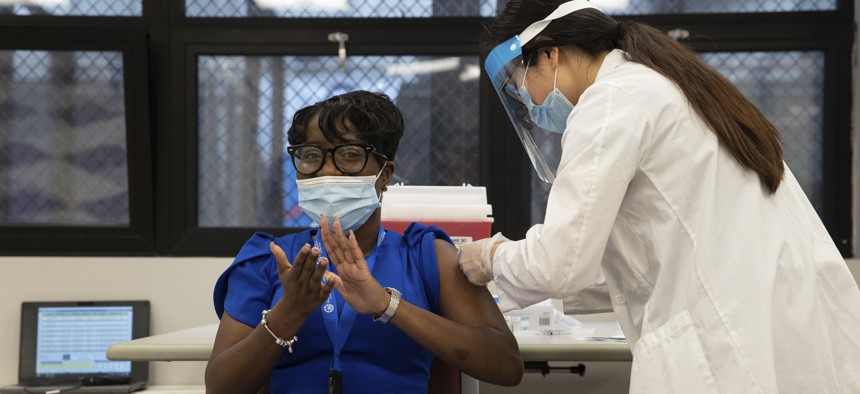Some Health Care Workers Refuse Covid Vaccine

A nursing home staff receives the COVID-19 vaccine by CVS Pharmacist at Harlem Center for Nursing and Rehabilitation, a nursing home facility, on Friday, Jan. 15, 2021 in Harlem neighborhood of New York. AP Photo/Yuki Iwamura
One survey found 15% of health care workers who were offered a coronavirus vaccine didn't want it.
It was a month ago that frontline health care workers across the United States enthusiastically rolled up their sleeves to receive the first Covid-19 vaccines.
Even as the vaccine has now been made available to broader segments of the public, many in the health care sector have yet to be vaccinated—with some refusing to get inoculations over concerns about safety or efficacy.
Estimates vary, but some recent surveys indicate anywhere between 15% and 29% of health care workers may decline to get the vaccine.
A survey of 2,500 health care workers who had been offered the vaccine found that 15% had already refused it, according to Surgo Ventures, which conducted the poll last month.
About a quarter of the public has expressed hesitance about receiving the vaccine, with 27% of people saying they would probably not or definitely not get it, according to the latest poll conducted by the Kaiser Family Foundation in late November.
The same poll found that a slightly higher percentage of health care workers, 29%, would probably or definitely not get the vaccine.
Among the health care workers who refused a Covid-19 vaccine, 31% cited lack of evidence about the effectiveness or safety of the vaccine as the reason for their reluctance, the Surgo poll found. Another 24% cited “personal safety concerns” and 16% said they worried that the vaccine approval process had been rushed.
The degree of wariness isn’t surprising given the mistrust that some health care workers have of their employers, particularly given their working conditions amid the pandemic, said Lori Porter, co-founder and CEO of the National Association of Health Care Assistants, a group representing certified nursing assistants.
“There is a total lack of trust in management,” Porter said.
The assistants that staff nursing homes were overworked and underpaid even before the pandemic hit, Porter said. So, when nursing home operators are the ones telling workers to be vaccinated, those workers are skeptical.
Other healthcare workers have expressed what experts say are unfounded concerns that they are being used as guinea pigs for a rapidly-developed vaccine.
Stormy Tatom, 30, a hospital intensive care unit nurse in Beaumont, Texas, told the Associated Press that she has held off getting the vaccine “because of the unknown long-term side effects.”
“I would say at least half of my coworkers feel the same way,” Tatom said.
Government leaders have already recognized the public health challenges they face in getting vaccines to the general public, including to residents of remote areas and in communities where skepticism of both government and the vaccine runs high. So the refusals among health care workers are particularly frustrating to state and local officials, many of whom have been publicly vaccinated themselves in an effort to boost confidence in the vaccine.
In Ohio, Gov. Mike DeWine complained recently that 60% of nursing home staff have not elected to take the vaccine. Coronavirus outbreaks at nursing homes have been particularly deadly.
The state plans to make three passes at nursing homes to distribute vaccines. After the third visit, staff who want a vaccine would have to seek it out on their own.
"We aren’t going to make them but we wish they had a higher compliance," DeWine said at a press conference last month. “Everyone makes their own choice about this but we want to make it clear that opportunity may not come back for a while.”
Some nursing home operators have tried to sweeten the deal, offering incentives ranging from cash, to free breakfasts at Waffle House, to raffles for a new car for workers who do get vaccinated.
Porter doesn’t believe incentives will be enough to sway those who are distrustful. Instead, she suggested that nursing homes should connect reluctant workers with colleagues who have been vaccinated to discuss their experiences or with family members of nursing home residents who are concerned about the wellbeing of their loved ones.
“The family members would have far more influence over [certified nursing assistants] than anyone in management would or anyone in government would,” Porter said. “That’s the people they respect.”
Andrea Noble is a staff correspondent with Route Fifty.
NEXT STORY: Biden Sworn in as President, Promising Truthful Government to Tackle Crises





